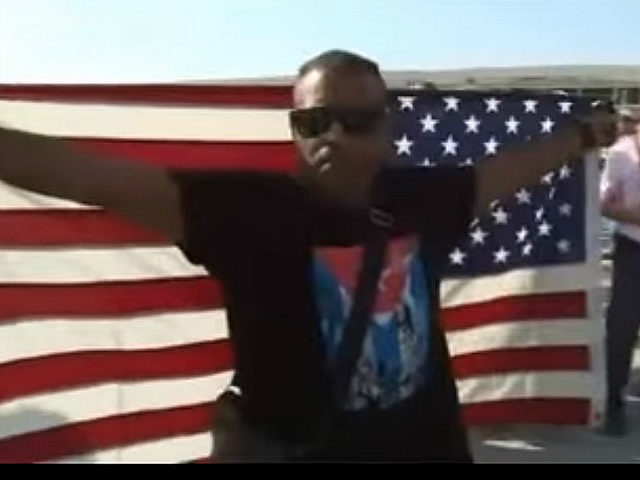As the media celebrated the incoming windfall to the communist Castro regime with the first commercial cruise voyage from the United States to Havana in nearly 40 years, a Cuban man was arrested in the capital city for welcoming the ship with a U.S. flag.
The man, who identified himself as Daniel Llorente before international news cameras congregating to record the arrival of the Adonia cruise ship from Florida, stood silently holding an American flag by the waters where the ship was to dock. Surrounded by curious tourists, he is approached by a woman who begins to yell insults at him, calling him a “hypocrite” and “clown.” The woman also rubs two fingers on her forearm, a well-known Cuban gesture meant to derisively highlight that someone is black.
Llorente, who is black, does not address her racial taunt, instead speaking to the crowd. “I use whatever flag I want because I am free,” he says. “I am not a hypocrite, not like all the Cubans marching yesterday — all those Cubans are hypocrites.” Llorente is referring to the Cuban International Workers’ Day Parade, in which the communist regime forces Cubans to hoist up images of Che Guevara and Fidel Castro and march into Havana’s Plaza of the Revolution. Among the distinguished guests at Sunday’s affair were the leaders of the Revolutionary Armed Forces of Colombia (FARC), the world’s wealthiest non-jihadist terrorist organization.
“Freedom is the right of all men to be honorable and to speak without hypocrisy,” Llorente tells the crowd, paraphrasing Cuban poet and founding father José Martí and using a quote President Obama fumbled in his 2014 speech announcing concessions to the Castro regime.
Llorente goes on to call the American flag “the pride of the Americans” and a “symbol of a nation.” “I don’t fear the government,” he tells the crowd. “Obama said it, if the people want freedom, they have to take it.”
“I am here to show the Cuban people that yes, we can,” Llorente concludes, before plain-clothed officers violently apprehend him. He is seem on camera being shoved into an unmarked car as the crowd begins to chant “Viva Fidel”:
This is not the first time Llorente appears publicly wrapped in the American flag. The Miami Herald found him “huddled catty-corner” in front of the U.S. embassy in Havana during President Obama’s visit in March, hoping to catch a glimpse. He praised the President for having “such great courage to speak the truth here, in front of everyone.”

At the time, Cuban police did not bother him for waving the flag (photo via Cuba en Miami).
President Obama’s visit to Cuba is seen as a necessary catalyst for the Carnival Cruise line’s Adonia to have made its first trip to the island on Sunday. Carnival initially agreed to ban U.S. citizens from buying cruise tickets if they had been born in Cuba, as a means of appeasing the communist government. After weeks of protests and a lawsuit citing a violation of the 1964 Civil Rights Act, Carnival backtracked, forcing Havana to accept Cuban-American visitors.
Cuban exiles nonetheless protested the cruise ship’s departure, with the group Movimiento Democracia staging a maritime protest against the Cuban government’s special visa demands for Cuban-Americans and bans on politically active Cuban-Americans from visiting relatives at home.
Cuba remains an extremely oppressive climate for pro-democracy activists, with studies showing that the government has become more violent against its opponents in the more than a year following President Obama’s announcement he would pursue “normalization” with the communist regime in Havana.
President Obama’s visit to Cuba particularly triggered a wave of state violence. “Instead of assuring an atmosphere of civilian peace, a true wave of police oppression consisting of innumerable intimidating actions was unleashed,” the Cuban Commission for Human Rights and National Reconciliation (CCDHRN), an NGO that tracks politically-motivated arrests on the island, said in a statement in April.

COMMENTS
Please let us know if you're having issues with commenting.